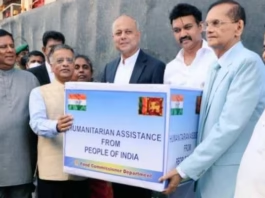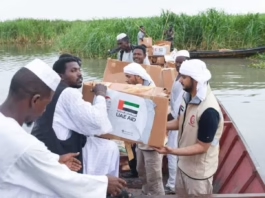Introduction to the Initiative
In a significant move aimed at fortifying community resilience in Asia and the Pacific, the United Arab Emirates (UAE) has announced a groundbreaking allocation of $10 million. This initiative seeks to enhance the ability of communities in these regions to withstand and recover from natural disasters, addressing an urgent need for increased preparedness in the face of escalating climate challenges. The announcement comes on the heels of an urgent call to action from President Sheikh Mohamed bin Zayed Al Nahyan, who emphasized the importance of international cooperation and proactive measures in disaster management.
The rising frequency and intensity of natural disasters such as typhoons, earthquakes, and floods have underscored the vulnerabilities faced by communities in Asia and the Pacific. In response, the UAE’s leadership, recognizing its role on the global stage, has prioritized investments in humanitarian aid and disaster relief efforts. The $10 million will be funneled into projects that focus on strengthening infrastructure, enhancing emergency response capacities, and building local knowledge regarding disaster preparedness.
This initiative is not only about financial assistance; it reflects a holistic approach that the UAE aid agency aims to implement. The agency is poised to collaborate with local governments, non-governmental organizations, and other international partners to ensure that the allocated funds yield maximum impact. By investing in community resilience, the UAE strives to cultivate a culture of preparedness, enabling affected areas to bounce back more effectively when calamity strikes. This proactive stance aligns with the UAE’s broader humanitarian goals and reinforces its commitment to global solidarity in combating the adverse effects of climate change.
Partnerships to Achieve Goals
The UAE’s $10 million initiative aims to significantly enhance community resilience within Asia and the Pacific, prominently through strategic partnerships with influential organizations. Notably, the collaboration with Emirates Nature-WWF and the International Federation of the Red Cross and Red Crescent Societies (IFRC) underscores a collective commitment to implementing the ‘Community Resilience to Natural Disasters Programme.’ These partnerships are essential for aligning resources, expertise, and operational capacities to effectively address the vulnerabilities posed by natural disasters.
The Emirates Nature-WWF, renowned for its conservation efforts, brings crucial insights into sustainable practices that not only protect ecosystems but also strengthen the resilience of communities against environmental shocks. This organization plays a pivotal role in educating local communities about sustainable resource management, facilitating adaptation strategies that mitigate the impacts of climate change. Through effective community engagement, Emirates Nature-WWF empowers individuals to take proactive measures towards enhancing their resilience, thereby fostering a stronger societal framework in the face of adversity.
Similarly, the IFRC’s extensive experience in emergency preparedness and response is invaluable. This organization has a well-established network across the region, enabling rapid mobilization of humanitarian assistance during disasters. By utilizing its methodologies and frameworks, the program ensures that community-based approaches are grounded in best practices that have proven successful in various contexts. The IFRC’s focus on local volunteers further amplifies efforts, as it promotes community ownership of resilience strategies, ensuring that they are tailored to specific local needs and conditions.
Through collaborative frameworks, these partnerships are structured to achieve several strategic objectives, including enhancing knowledge sharing, resource allocation, and innovation in disaster preparedness. By leveraging the strengths of each partner, the ‘Community Resilience to Natural Disasters Programme’ is poised to foster a more resilient future for communities throughout Asia and the Pacific.
Core Focus Areas of the Programme
The UAE’s $10 million initiative, aimed at enhancing community resilience in Asia and the Pacific, is structured around three primary pillars: the restoration of natural protective systems, the promotion of sustainable livelihoods, and the strengthening of community preparedness. Each of these pillars plays a crucial role in building a robust framework that can effectively respond to natural disasters.
The first pillar focuses on the “restoration of natural protective systems.” This encompasses various efforts to rehabilitate and enhance ecosystems such as mangroves, wetlands, and coral reefs, which serve as natural barriers against disasters like storms and flooding. By investing in these ecosystems, communities can reduce the impact of natural disasters, ensuring greater safety and sustainability. The expected outcome of this initiative includes improved coastal defenses, increased biodiversity, and greater ecological balance.
Next, the programme emphasizes the “promotion of sustainable livelihoods.” This pillar involves supporting local economies through education and training programs that encourage environmentally friendly practices. By fostering skills in sustainable agriculture, fisheries, and tourism, communities can diversify their income sources and build economic resilience. The initiative aims to create job opportunities while minimizing ecological footprints and encouraging sustainable resource management. As a result, we anticipate strengthened local economies and reduced vulnerability to external shocks.
Finally, the “strengthening community preparedness” pillar focuses on enhancing the readiness and response capabilities of communities in the face of natural disasters. This involves training programs, developing emergency response plans, and increasing awareness about disaster risk reduction strategies. By encouraging community participation and engagement, the initiative aims to create well-informed residents who can effectively respond to crises. The ultimate goal is to build a culture of preparedness, which will lead to faster recovery times and less severe impacts from future disasters.
Implementation and Future Prospects
The UAE’s recent $10 million initiative seeks to enhance community resilience in Asia and the Pacific, specifically targeting countries such as the Philippines, Indonesia, Fiji, and the Solomon Islands. The implementation strategy for this program is innovative and multifaceted, integrating local knowledge and resources with international best practices. By engaging local governments, community organizations, and international NGOs, the initiative aims to establish a framework that not only addresses immediate needs but also fosters long-term sustainability.
A key component of the implementation strategy is the focus on capacity building within the targeted communities. Training programs will be rolled out to equip local leaders and community members with essential skills in disaster risk reduction, emergency response, and resource management. This localized approach ensures that the initiative remains relevant and tailored to the unique contexts of each country, promoting ownership and commitment from the communities involved.
Moreover, the program is designed with scalability in mind. By leveraging established partnerships and networks, there is potential for the initiative to expand beyond the initial target countries. The successful models developed in the Philippines, Indonesia, Fiji, and the Solomon Islands can serve as blueprints for similar interventions in other vulnerable regions throughout Asia and the Pacific. This scalability allows for the sharing of knowledge and resources, creating a ripple effect that can significantly enhance resilience across multiple communities.
Looking to the future, the long-term vision for this initiative encompasses not just immediate disaster response but also comprehensive strategies for climate adaptability and socio-economic stability. Addressing underlying vulnerabilities will be a critical focus, ensuring that communities are not only prepared for future natural hazards but are also empowered to thrive in the face of adversity. Ultimately, building resilience requires a sustained commitment to fostering collaboration, innovation, and community engagement, all of which are central to the UAE’s initiative.




